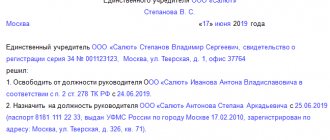Who is entitled to compensation for vacation?
The employer pays compensation to everyone who has worked for at least half a month, including part-time workers and those who have entered into a fixed-term employment contract.
Let's say Marina got a job on July 23, 2021, but two weeks later she realized that she was not ready to continue. The employment contract established a probationary period. According to all the rules, Marina wrote a statement within three days and left the company on August 9. 17 days have passed since her employment, so Marina will receive compensation for 2.33 days of unused vacation. We will explain below why exactly 2.33 days.
If Marina had come to her senses a week earlier and worked only 10 days, she would not have received compensation.
The half-month rule is spelled out in a very old, but still valid document - paragraph 35 of the “Rules on regular and additional vacations dated April 30, 1930 No. 169.”
It may seem illogical that the right to the first vacation arises only after six months of work, and compensation is due after half a month, but this is true. You need to accept, put up with and pay.
Terms of payment of wages upon dismissal
Payments to an employee upon dismissal are made regardless of the wishes of the manager and the presence of controversial issues.
The payment period is clearly stated in the Labor Code of the Russian Federation:
- if the employee is at the workplace, the salary is issued on the last working day. In its absence - no later than one day from the submission of a written claim for compensation;
- if a specialist goes on vacation with subsequent dismissal, the calculation occurs on the last day before the vacation or when vacation pay is issued;
- In case of loss of ability to work, payments are made on the day the sick leave is provided.
Once the dismissal order has been approved, the employer has no reason to delay payment. Causing material damage by an employee often complicates the process of full settlement.
If the fact of causing material losses is confirmed by an official investigation, the calculation is made minus their amount. If an employee does not consider himself guilty or does not agree with the amount of deduction, he has the right to appeal the decision of his superiors in court.
Expert opinion
Irina Vasilyeva
Civil law expert
Causing material damage is not grounds for delaying or denying payment of compensation to a worker.
Calculation of vacation compensation when dismissing employees or how to calculate compensation
Calculating vacation pay upon dismissal is not complicated, but it is tedious due to several variables, so the easiest way to calculate it is with a calculator.
If you do the math yourself, multiply your average daily earnings (ADE) by the number of days of unused vacation. This will be the formula for calculating the amount of compensation.
Compensation = SDZ × Number of days of unused vacation
An example of calculating compensation for unused vacation
Let's assume Roma gets a job in January 2021. He decided to resign on September 2, 2021. In 2021, Roma took a vacation from September 3 to September 17, 2021.
The billing period is from September 1, 2021 to August 31, 2021. We subtract 2 weeks of vacation from it, so the billing period is not fully worked out.
In the pay period he has 11 full months worked.
September 2021 has not been fully worked out, so the calculation is: 29.3 / 30 × (30 − 14) = 15.63 days.
During the billing period, Roma earned 750,000 rubles.
SDZ = 750,000 / (29.3 ×11 + 15.63) = 2,219.39 rubles.
Roma's vacation experience is 18 months.
Total number of vacation days = 18 months × 2.33 days = 41.94 days. According to the rounding rules, we get an integer - 42 days.
Roma has already gone on vacation for 14 calendar days. This means the number of unused days = 42 - 14 = 28.
Compensation = 2,219.39 RUR × 28 days = 62,142.92 RUR.
What norms of the Labor Code of the Russian Federation are violated by the employer?
First, let us recall what the law says on this issue. Firstly, according to Art. 140 of the Labor Code of the Russian Federation, on the day of dismissal, all payments must be made to the employee. An exception is a situation where the person being dismissed did not work on schedule that day or was absent for another reason. Then it should be calculated after submitting a request for this, the next day.
If a dispute arises regarding settlement amounts, an undisputed amount must be issued. In addition, upon a written application from the employee, he must be given all completed documents related to the work, and a work book or information about work activity (Article 84.1 of the Labor Code of the Russian Federation).
For each day of delay, the employee has the right to compensation of at least 1/150 of the key rate of the Central Bank of the Russian Federation (Article 236 of the Labor Code of the Russian Federation). In addition, when going to court regarding the problem of non-payment, the employee is exempt from legal costs (Article 393 of the Labor Code of the Russian Federation).
The following must be paid upon dismissal:
- salary for actual time worked;
- bonuses, additional payments, allowances, bonuses;
- compensation for unused vacation time;
- mandatory severance pay (for example, in case of layoff);
- other payments according to LNA.
Despite this, the problem of non-payment or partial non-payment of dismissal payments continues to occur. Compliance with the labor rights of citizens is controlled in the Russian Federation by several structures, the court is only one of them.
Responsibility
The labor inspectorate may find out about violations during an inspection. Or when the employee himself applies to the inspectorate or court.
For non-payment of compensation, the labor inspectorate may fine:
- organization in the amount of 30,000 to 50,000 rubles;
- official (for example, the head of an organization) - from 1000 to 5000 rubles;
- entrepreneur - from 1000 to 5000 rubles.
Penalty for repeated violation:
- for organizations - from 50,000 to 70,000 rubles;
- officials and entrepreneurs - from 10,000 to 20,000 rubles;
For repeated violations, directors may be disqualified for up to three years.







